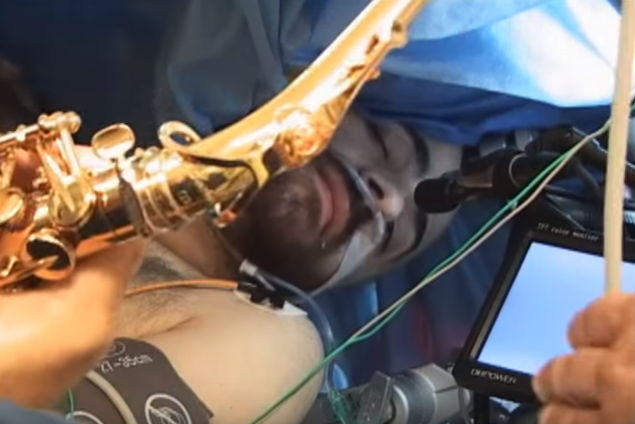Man Plays Saxophone During Brain Tumor Surgery To Show Musical Ability Was Preserved

A saxophone player received a round of applause from unlikely fans, while in a strange position: as he lay on the operating table. Music teacher Dan Fabbio, 25, had been diagnosed with a benign brain tumor that had been growing slowly since childhood, and which threatened his musical career. Following a successful surgery to remove the tumor, Fabbio proved his musical ability had been preserved by delivering a perfect saxophone performance right there in the operating room.
“He played it flawlessly and when he finished the entire operating room erupted in applause," said Elizabeth Marvin, a professor of music theory in the University of Rochester’s Eastman School of Music, in a statement.
Leading up to the surgery, researchers had to determine exactly where musical information was processed in Fabbio's brain so they could map it. In a case study, published in Current Biology, Marvin, along with Brad Mahon, an associate professor in the University of Rochester's Department of Brain and Cognitive Sciences, developed a series of musical tests for Fabbio to perform while inside an MRI machine. This type of scan is able to detect changes in oxygen levels, so the parts of the brain that were activated during testing could help researchers map the areas important for music and language processing. During these tests, Fabbio was asked to listen to and then hum back a series of short melodies. In addition, he performed language tasks where he would identify objects and repeat sentences.
When it came time for surgery, Dr. Web Pilcher, a neurosurgeon at the University of Rochester, used the map of Fabbio's brain developed by Mahon to guide him. Fabbio repeated the humming and language tasks from the MRI scan, and Marvin, the music theory professor, listened so she could signal to the surgeons whether or not they came across an area of the brain that disrupted music processing, which they needed to avoid.
The ability to process and repeat a tune is important, but surgeons wanted to know if they had successfully preserved his ability to perform after removing the tumor, so they wanted to have him play the sax during the procedure. This presented several challenges: he would have to lie on his side while playing and his brain could potentially protrude out of his skull due to the pressure caused by the deep breaths required to play long notes on the saxophone. This prompted both Fabbio and Marvin to choose a version of a Korean folk song that could be modified to be played with shorter and shallower breaths. He performed flawlessly.
Fabbio's procedure was meant to protect his primary audio cortex and other parts of the brain that would affect his ability to play music. Keeping patients like Fabbio awake during surgery by asking them to perform tasks can help doctors during complicated procedures.
This is not the first time a musician has stayed awake during brain surgery. In 2015, a man in Brazil performed the Beatles song "Yesterday" on his guitar while undergoing brain surgery. Anthony Kulkamp Dias, 33, played six songs at determined moments, though his right hand was weaker because that was the side doctors were operating on. Dias' type of brain tumor has not been disclosed, but his symptoms imply his tumor could have gotten progressively worse. Common symptoms of brain tumors include changes in a person's mental function and headaches, according to Medline Plus.
Both Fabbio and Dias gave standing ovation performances in the operating room. Fabbio has completely recovered, and returned to teaching music within six months of his surgery. Dias was successfully discharged and has continued to pursue his musical ambitions.
Source: Garcea FE, Chernoff BL, Diamond B et al. Direct Electrical Stimulation in the Human Brain Disrupts Melody Processing. Current Biology. 2017.



























